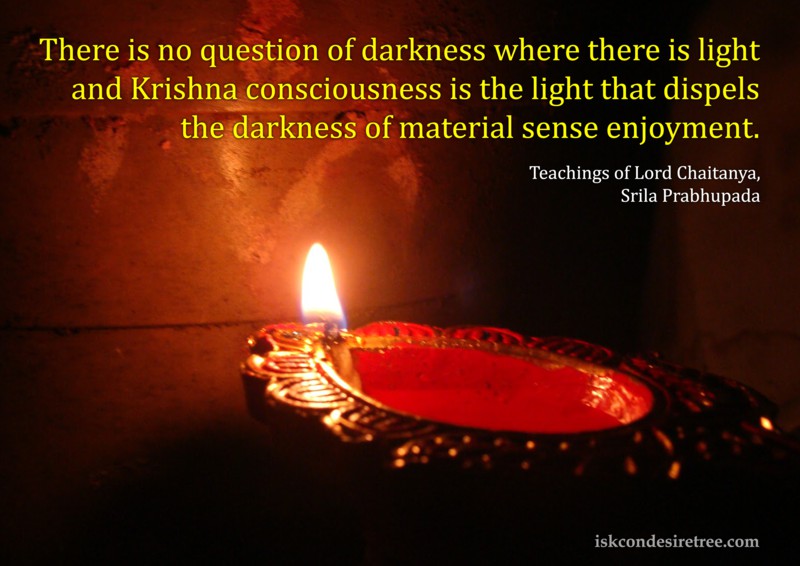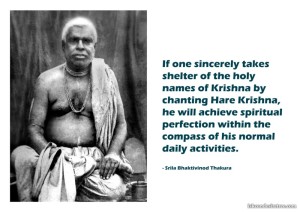Hare Krishna.
23rd July, 2015. Gurgaon

I am quoting some learning in Q&As format from Srimad Bhagavatam 3rd canto chapters 24 and 25.
Q: What is the distinction between maya consciousness and Krishna consciousness ?
Ans :
cetaḥ khalv asya bandhāya muktaye cātmano matam
guṇeṣu saktaṁ bandhāya rataṁ vā puṁsi muktaye (SB 3.25.15)
Translation
The stage in which the consciousness of the living entity is attracted by the three modes of material nature is called conditional life. But when that same consciousness is attached to the Supreme Personality of Godhead, one is situated in the consciousness of liberation.
Srila Prabhupada expands in his purport that : There is a distinction here between Kṛṣṇa consciousness and māyā consciousness. Guṇeṣu, or māyā consciousness, involves attachment to the three material modes of nature, under which one works sometimes in goodness and knowledge, sometimes in passion and sometimes in ignorance. These different qualitative activities, with the central attachment for material enjoyment, are the cause of one’s conditional life. When the same cetaḥ, or consciousness, is transferred to the Supreme Personality of Godhead, Kṛṣṇa, or when one becomes Kṛṣṇa conscious, he is on the path of liberation.
Q: Which is the best Yoga system and what is its purpose ?
Ans : The best yoga is bhakti Yoga and its purpose is spiritual realisation.
atyantoparatir yatra duḥkhasya ca sukhasya ca (SB 3.25.13)
Translation
The Personality of Godhead answered: The yoga system which relates to the Lord and the individual soul, which is meant for the ultimate benefit of the living entity, and which causes detachment from all happiness and distress in the material world, is the highest yoga system.
Srila Prabhupada writes in his purport : The yoga system, as here stated by the Lord, is meant to end all material happiness and material distress. The best yoga, as taught in Bhagavad-gītā by Kṛṣṇa, is bhakti-yoga….the yoga system is the science of the spirit. One practices yoga in order to attain perfection on the spiritual platform.
Q: How can I free my senses from the material contamination ?
yena sambhāvyamānena prapannāndhaṁ tamaḥ prabho (SB 3.25.7)
Translation
Devahūti said: I am very sick of the disturbance caused by my material senses, for because of this sense disturbance, my Lord, I have fallen into the abyss of ignorance.
Srila Prabhupada explains in his purport : Here the word asad-indriya-tarṣaṇāt is significant. Asat means “impermanent,” “temporary,” and indriya means “senses.” Thus asad-indriya-tarṣaṇāt means “from being agitated by the temporarily manifest senses of the material body.” We are evolving through different statuses of material bodily existence — sometimes in a human body, sometimes in an animal body — and therefore the engagements of our material senses are also changing. Anything which changes is called temporary, or asat. We should know that beyond these temporary senses are our permanent senses, which are now covered by the material body. The permanent senses, being contaminated by matter, are not acting properly. Devotional service, therefore, involves freeing the senses from this contamination. When the contamination is completely removed and the senses act in the purity of unalloyed Kṛṣṇa consciousness, we have reached sad-indriya, or eternal sensory activities. Eternal sensory activities are called devotional service, whereas temporary sensory activities are called sense gratification.
Q: What does it really mean when we read that God has no form? And then why does God has so many forms?
Ans : No form means no material form.
Kardama muni prays to Lord in SB 3.24.31 that
tāny eva te ’bhirūpāṇi rūpāṇi bhagavaṁs tava
yāni yāni ca rocante sva-janānām arūpiṇaḥ
Translation
My dear Lord, although You have no material form, You have Your own innumerable forms. They truly are Your transcendental forms, which are pleasing to Your devotees.
Srila Prabhupada adds in his Purport :
In the Brahma-saṁhitā it is stated that the Lord is one Absolute, but He has ananta, or innumerable, forms. Advaitam acyutam anādim ananta-rūpam [Bs 5.33]. The Lord is the original form, but still He has multiforms. Those multiforms are manifested by Him transcendentally, according to the tastes of His multidevotees. It is understood that once Hanumān, the great devotee of Lord Rāmacandra, said that he knew that Nārāyaṇa, the husband of Lakṣmī, and Rāma, the husband of Sītā, are one and the same, and that there is no difference between Lakṣmī and Sītā, but as for himself, he liked the form of Lord Rāma.
In a similar way, some devotees worship the original form of Kṛṣṇa. When we say “Kṛṣṇa” we refer to all forms of the Lord — not only Kṛṣṇa, but Rāma, Nṛsiṁha, Varāha, Nārāyaṇa, etc. The varieties of transcendental forms exist simultaneously. That is also stated in the Brahma-saṁhitā: rāmādi-mūrtiṣu. .. nānāvatāram. He already exists in multiforms, but none of the forms are material. Śrīdhara Svāmī has commented that arūpiṇaḥ, “without form,” means without material form.
The Lord has form, otherwise how can it be stated here, tāny eva te ‘bhirūpāṇi rūpāṇi bhagavaṁs tava: “You have Your forms, but they are not material. Materially You have no form, but spiritually, transcendentally, You have multiforms”? Māyāvādī philosophers cannot understand these transcendental forms of the Lord, and being disappointed, they say that the Supreme Lord is impersonal. But that is not a fact; whenever there is form there is a person. Many times in many Vedic literatures the Lord is described as puruṣa, which means “the original form, the original enjoyer.” The conclusion is that the Lord has no material form, and yet, according to the liking of different grades of devotees, He simultaneously exists in multiforms, such as Rāma, Nṛsiṁha, Varāha, Nārāyaṇa and Mukunda. There are many thousands and thousands of forms, but they are all viṣṇu-tattva, Kṛṣṇa.
All glories to Srimad Bhagavatam.
All glories to Srila Prabhupada.
All glories to Sri Guru and Gauranga.



